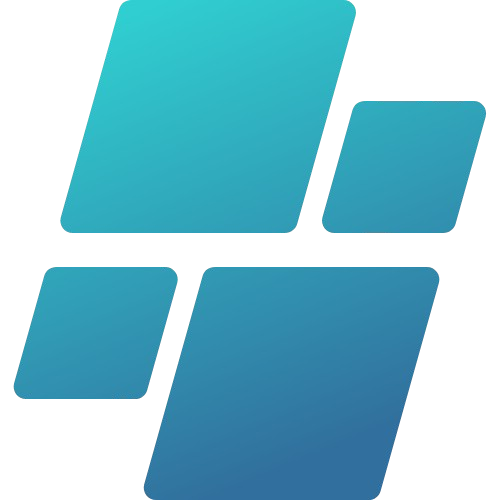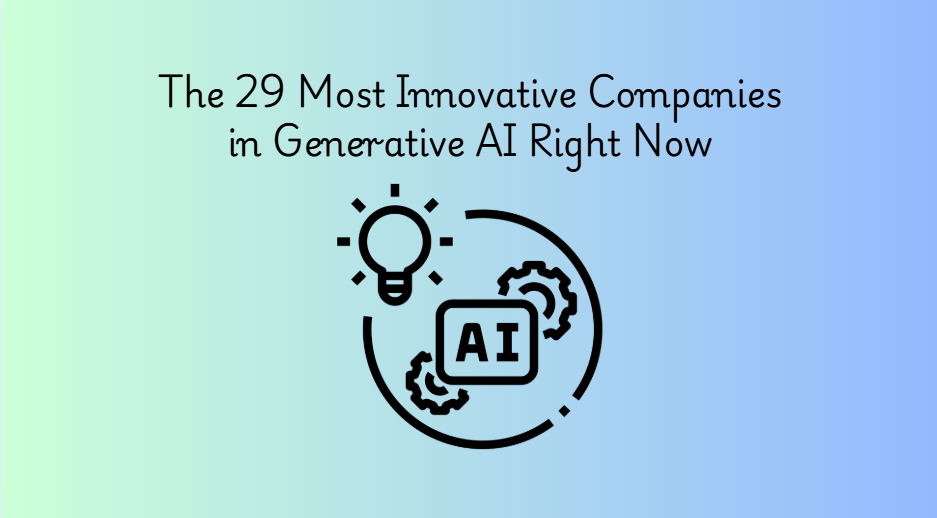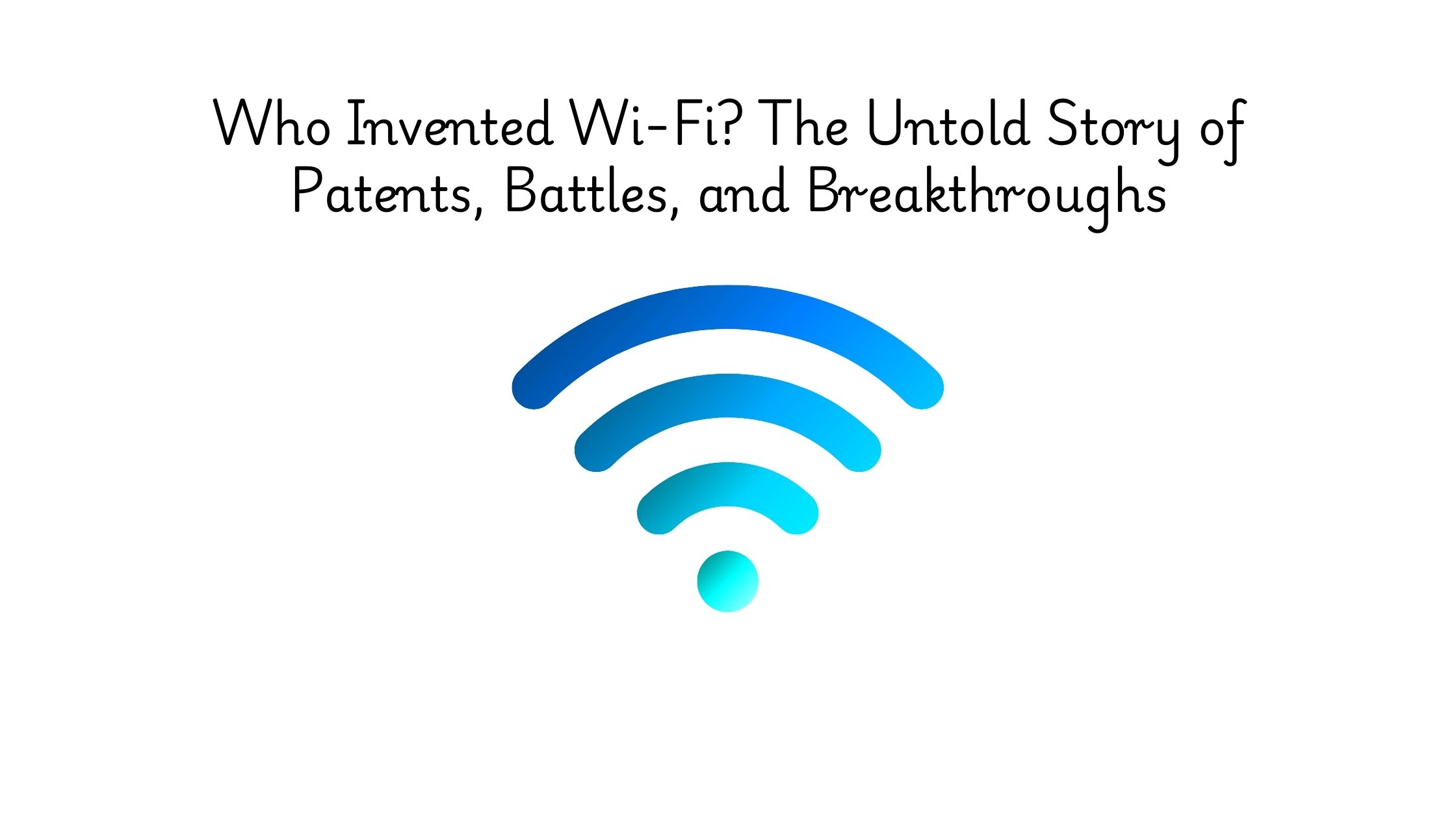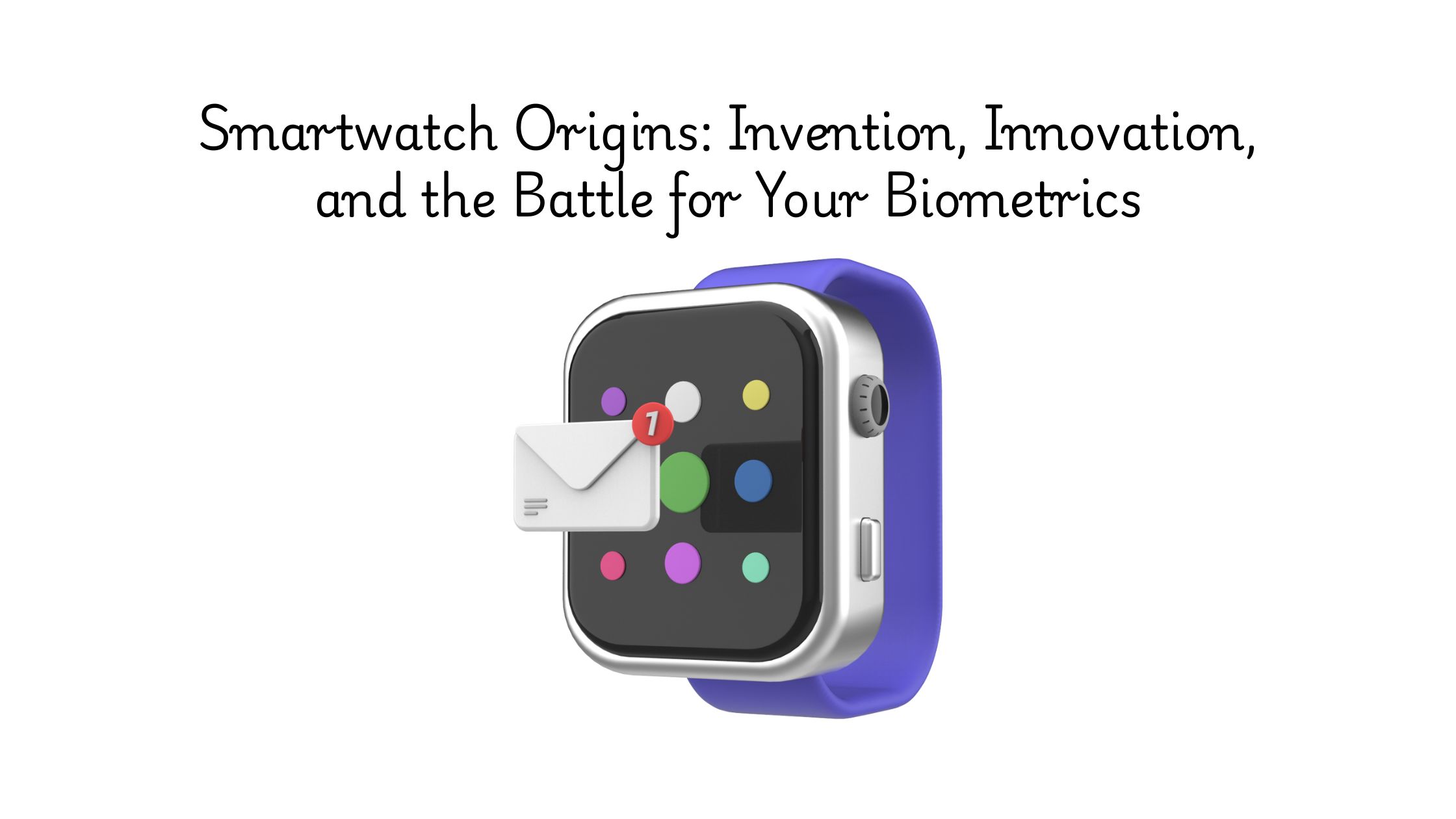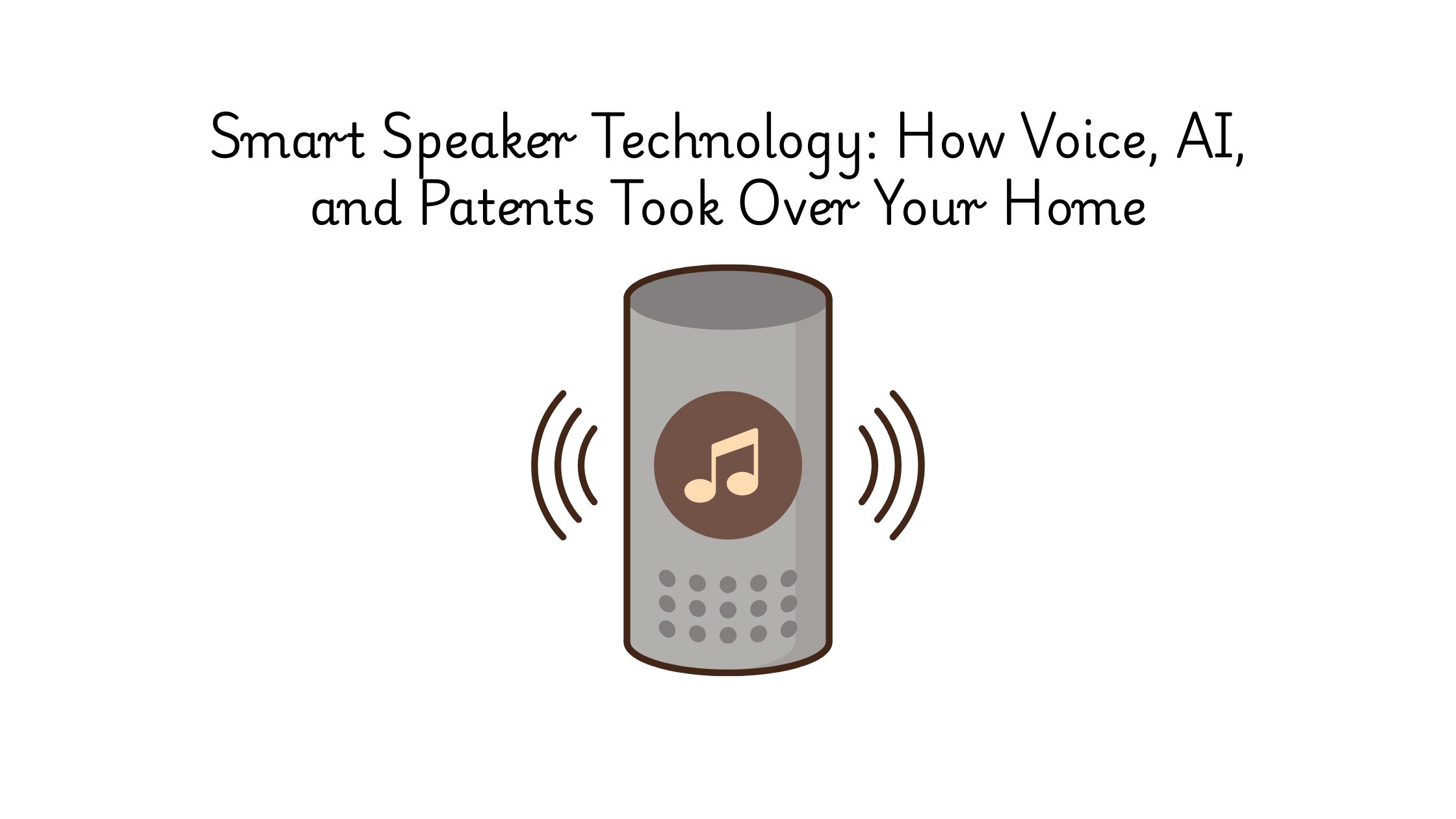Generative AI is no longer an experimental technology; it is transforming industries, from automating software development to revolutionizing drug discovery. A McKinsey report estimates that generative AI could contribute up to $4.4 trillion annually, impacting sectors like finance, healthcare, and manufacturing.
But which companies are actually leading the charge in developing generative AI solutions?
This list of 29 companies spans the United States and Europe, highlighting those at the forefront of AI research and application. These companies are not just integrating AI; they are building the foundation for the next generation of AI-powered tools and services.
How we selected these companies – You ask?
Each company in this list was evaluated based on:
- AI innovation & product development – What generative AI models or applications are they building?
- Industry impact – Which sectors are they transforming with AI?
- Patent activity – Have they secured patents that signal deep investment in AI? (Where available, we’ll highlight notable patents.)
This article covers both established tech giants and AI-first startups pushing the boundaries of generative AI.
Let’s explore the top 29 generative AI companies shaping the future.
#1. OpenAI
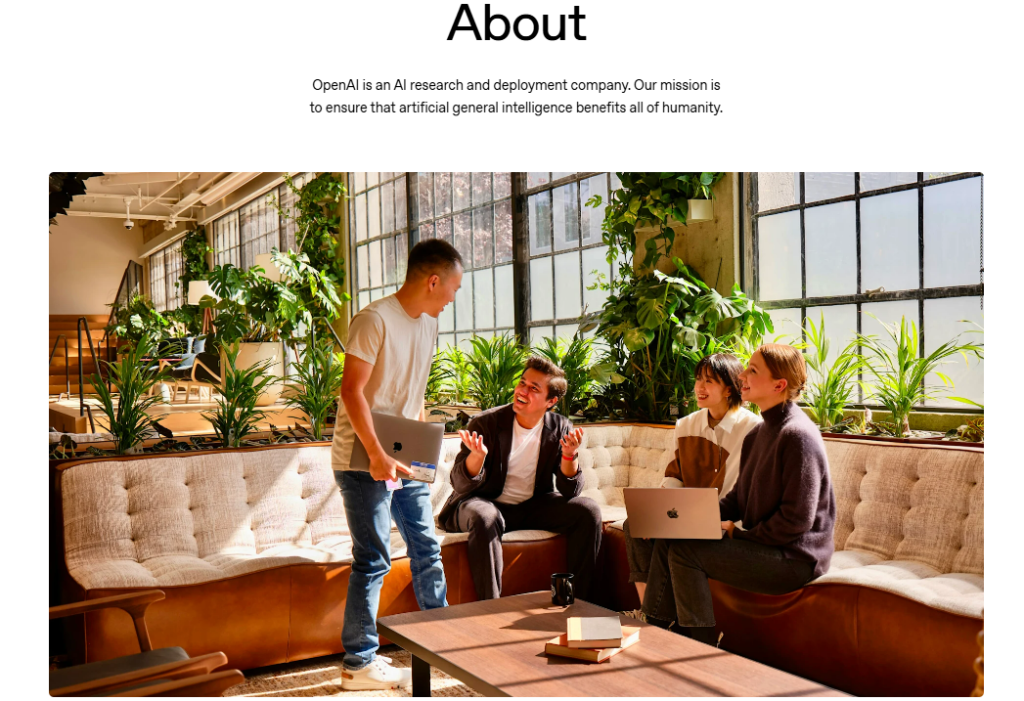
Source – Open AI
Founded: 2015
Headquarters: San Francisco, California
Generative AI Products:
- GPT-4: A state-of-the-art language model capable of understanding and generating human-like text, powering applications such as ChatGPT.
- DALL·E: An AI system that creates images from textual descriptions, enabling users to generate visuals by simply describing them.
Industry Impact:
- Domain transformation: Revolutionizing content creation, customer service, and creative industries by providing advanced text and image generation capabilities.
- Catering to: Various sectors including education, entertainment, marketing, and more, by offering tools that enhance creativity and efficiency.
Notable OpenAI Patents in Generative AI:
US11922550B1: Systems and Methods for Hierarchical Text-Conditional Image Generation
This patent covers techniques for generating images based on textual descriptions, employing hierarchical models to enhance image quality and relevance to the input text.
US11922144B1: Schema-Based Integration of External APIs with Natural Language Applications
It details methods for integrating external APIs with natural language processing applications, facilitating seamless data exchange and functionality extension.
US11886826B1: Systems and Methods for Language Model-Based Text Insertion
This patent focuses on utilizing language models to insert text into existing documents intelligently, aiding in content creation and editing processes.
These patents exemplify OpenAI’s commitment to advancing generative AI technologies, encompassing areas from text and image generation to code synthesis and system integration. The company’s strategic focus on patenting reflects its dedication to protecting its innovations while promoting the growth of AI technologies.
OpenAI’s advancements in generative AI have significantly influenced the development of intelligent applications across multiple industries.
#2. Google DeepMind
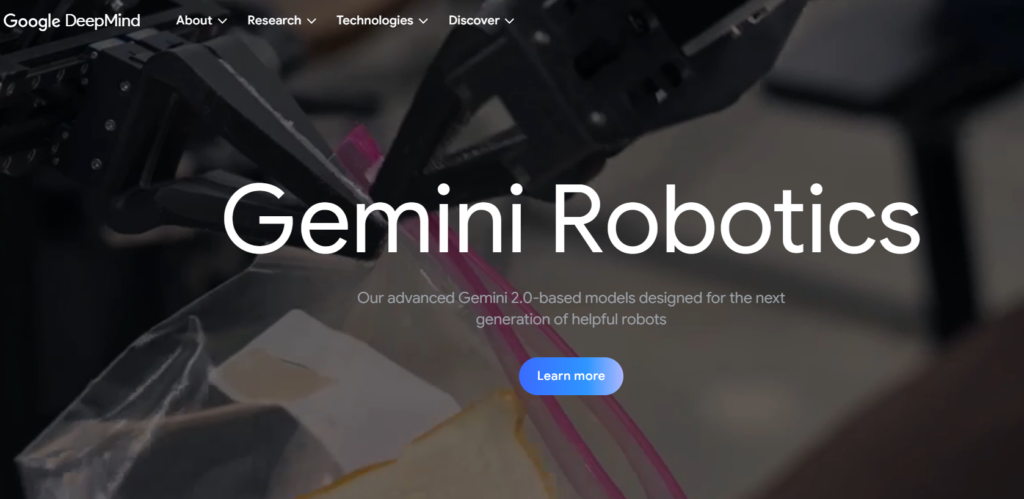
Source – Google Deepmind
Founded: 2010 (as DeepMind Technologies); acquired by Google in 2015
Headquarters: London, United Kingdom
Generative AI Products:
- Gemini: A multimodal large language model, successor to Google’s LaMDA and PaLM 2, designed to understand and generate human-like text, images, and audio. Released in December 2023, Gemini comes in three sizes: Nano, Pro, and Ultra.
- Gemma: A collection of open-weight large language models, available in various sizes, optimized for different computational resources, and trained on extensive datasets to perform diverse natural language processing tasks.
Industry Impact:
- Domain transformation: Advancing the fields of natural language understanding and multimodal AI by developing models capable of processing and generating multiple forms of data, thereby enhancing user interaction and accessibility.
- Catering to: Various sectors including technology, healthcare, and education, by providing AI solutions that improve data analysis, decision-making, and user engagement.
Notable Google DeepMind Patents in Generative AI:
US11934935B2: Feedforward Generative Neural Networks
This patent describes a feedforward generative neural network capable of producing multiple output samples in a single inference. The system can generate speech waveforms conditioned on linguistic features of text input, improving speech synthesis and generative modeling.
US12046249B2: Bandwidth Extension of Incoming Data Using Neural Networks
This patent covers a method for enhancing low-resolution data by processing it through conditioning and generative neural networks. The technique is used to reconstruct high-fidelity signals from limited input, applicable in audio and image processing.
US12032869B2: Resolving Time-Delays Using Generative Models
This patent focuses on generating audio output samples predicted to be communicated by a user. A trained neural network predicts and generates the next audio step, improving real-time speech processing and conversational AI systems.
These patents highlight DeepMind’s commitment to advancing generative AI technologies across various applications, including neural network architecture, machine learning adaptability, and 3D modeling.
#3. Microsoft

Source: Microsoft
Founded: 1975
Headquarters: Redmond, Washington
Generative AI Products:
- Copilot: An AI assistant integrated into Microsoft 365 applications (such as Word, Excel, and PowerPoint) to enhance productivity by assisting with content generation, data analysis, and creative tasks.
- Azure OpenAI Service: Provides businesses with access to OpenAI’s powerful models, enabling them to build and deploy AI applications on Microsoft’s cloud platform.
Notable Microsoft Patents in Generative AI:
Customized Recommendation Generation Using Enterprise Data Analysis and Inference:
20140025609 outlines a system that monitors user interactions with documents and collaborators to provide personalized recommendations. By analyzing access patterns and contributor interactions, the system aims to enhance collaboration and productivity within enterprise environments.
Inter-Document Links Involving Embedded Documents:
20140013197 describes a neural network-based approach to comprehend relationships between words or phrases across multiple documents. The technology facilitates improved analysis and response generation by understanding contextual influences, enhancing tasks such as document summarization and information retrieval.
These patents underscore Microsoft’s commitment to integrating generative AI across various applications, from enterprise solutions to interactive gaming experiences.
#4. Anthropic
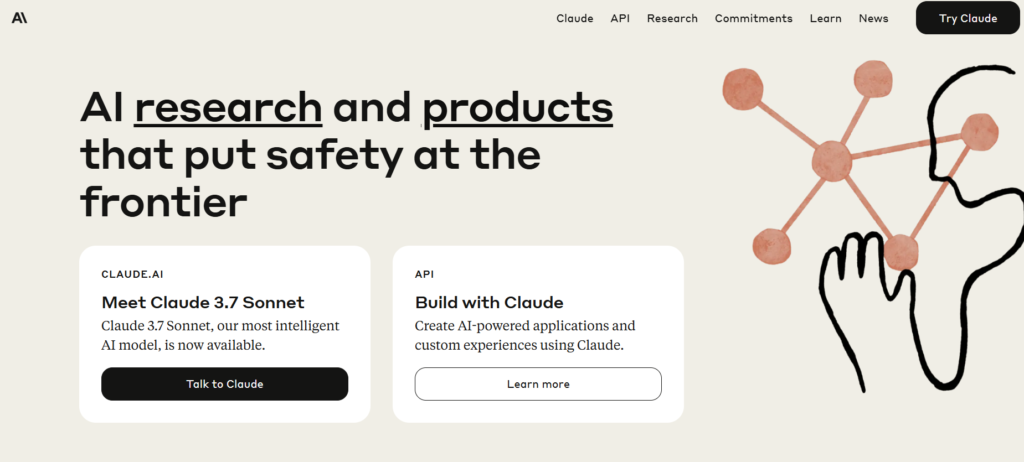
Source: Anthropic
Founded: 2021
Headquarters: San Francisco, California
Generative AI Products:
- Claude: A family of advanced language models designed to understand and generate human-like text, offering capabilities such as drafting emails, writing code, and providing conversational assistance.
Industry Impact:
- Domain Transformation: Enhancing AI safety and reliability by focusing on building interpretable and steerable AI systems, thereby setting new standards in AI development practices.
- Catering To: Various sectors including technology, customer service, and education, by providing AI solutions that prioritize safety and ethical considerations.
Anthropic, an AI safety and research company founded in 2021, is dedicated to developing reliable, interpretable, and steerable AI systems. While Anthropic has actively published research in the AI domain, it has not filed any AI-related patents between 2014 and 2024.
However, it’s important to note that Anthropic has faced legal challenges concerning its AI training practices. In August 2024, authors Andrea Bartz, Charles Graeber, and Kirk Wallace Johnson initiated a class action lawsuit against Anthropic, alleging unauthorized downloading and copying of their works to train Anthropic’s AI model, Claude. The lawsuit raises questions about the legality of using copyrighted materials for AI training without permission.
These developments highlight the evolving landscape of AI research, intellectual property rights, and ethical considerations in AI training methodologies.
#5. NVIDIA
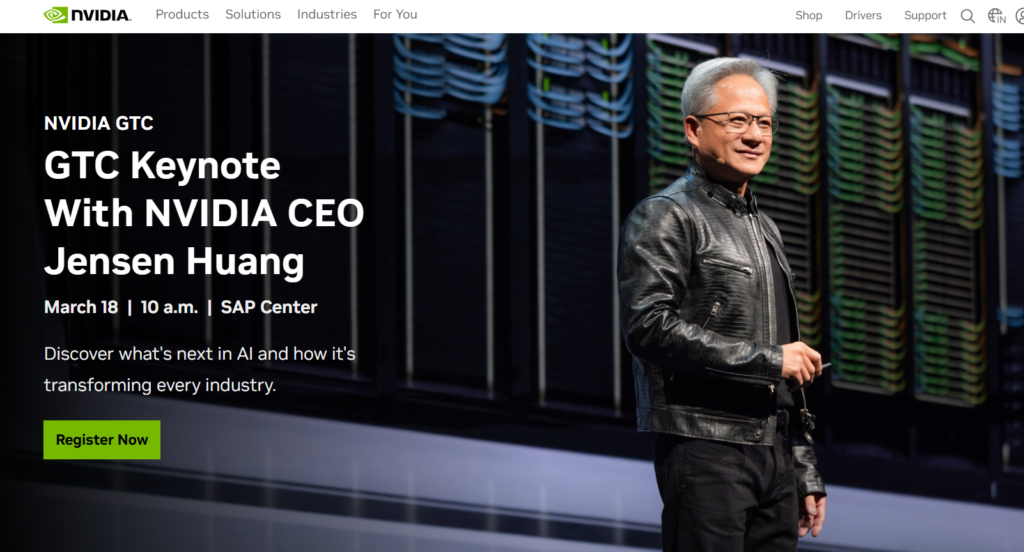
Source: Nvidia
Founded: 1993
Headquarters: Santa Clara, California
Generative AI Products:
- DGX GH200: An advanced AI supercomputing platform designed to accelerate generative AI workloads, enabling organizations to train large language models and other AI applications more efficiently.
Industry Impact:
- Domain Transformation: Revolutionizing the AI hardware industry by providing high-performance computing solutions that support the development and deployment of generative AI models.
- Catering To: Various sectors including technology, healthcare, automotive, and finance, by offering AI infrastructure that enhances data processing and analytics capabilities.
Strategic Patent Position:
While NVIDIA ranks ninth in the number of AI chip patents, it leads in “forward citations,” indicating that its patents are frequently referenced by other innovators, underscoring their influence and importance in the AI field.
These patents and legal developments highlight NVIDIA’s pivotal role in advancing generative AI technologies and the complexities associated with intellectual property in this rapidly evolving sector.
#6. Meta Platforms (formerly Facebook)

Source: Meta
Founded: 2004
Headquarters: Menlo Park, California
Generative AI Products:
- Llama (Large Language Model Meta AI): An open-source series of large language models designed to advance research and practical applications in natural language processing.
Industry Impact:
- Domain Transformation: Promoting open-source AI development, enabling researchers and developers worldwide to build upon and innovate with advanced language models.
- Catering To: Various sectors, including technology, academia, and startups, by providing accessible AI tools that foster innovation and collaboration.
Strategic Importance of AI and Machine Learning Patents for Meta:
Meta’s investment in AI and machine learning patents serves multiple strategic purposes:
Competitive Advantage: Patents protect Meta’s innovations, preventing unauthorized use by competitors and reinforcing its position as a leader in AI-driven technologies.
Driving Innovation: By securing patents on emerging AI technologies, Meta influences the direction of research and development, ensuring alignment with its long-term objectives.
Advancing AI and ML Research: Meta’s patents contribute to the broader AI community by enabling collaborative research and promoting open innovation, fostering advancements across various industries.
Legal Considerations:
The evolving landscape of AI technology has introduced legal complexities, particularly concerning the use of generative AI models and intellectual property rights. Meta’s development of models like Llama has sparked debates about the intersection of generative AI, copyright, and trade secrets. Concerns have been raised about the transparency of training data and the ethical use of such models, highlighting the need for clear standards and regulations in AI development.
These developments reflect Meta’s active role in shaping the future of AI technologies, emphasizing both innovation and the importance of navigating the associated legal and ethical challenges.
#7. Amazon

Source: Amazon
Founded: 1994
Headquarters: Seattle, Washington
Generative AI Products:
- Review Summaries: An AI-driven feature that synthesizes customer reviews into concise summaries, aiding shoppers in making informed decisions without sifting through numerous individual reviews.
Industry Impact:
- Domain Transformation: Enhancing the e-commerce experience by streamlining information retrieval and improving customer satisfaction through AI-generated insights.
- Catering To: E-commerce and retail sectors, focusing on both consumer convenience and vendor feedback mechanisms.
Strategic Focus and Initiatives:
Beyond patent filings, Amazon has actively invested in AI research and development. In mid-2024, AWS announced a $230 million commitment to accelerate the creation of generative AI applications by startups worldwide, highlighting Amazon’s dedication to fostering innovation in the AI sector.
Additionally, Amazon’s AI initiatives extend to academia through programs like the Amazon Nova AI Challenge, which focuses on advancing secure, AI-assisted software development. This global competition encourages university teams to develop models that enhance the safety and reliability of AI applications, reflecting Amazon’s commitment to responsible AI development.
These patents and initiatives underscore Amazon’s role as a significant player in AI innovation, with a focus on enhancing user experiences, advancing technological capabilities, and promoting ethical AI practices.
#8. IBM
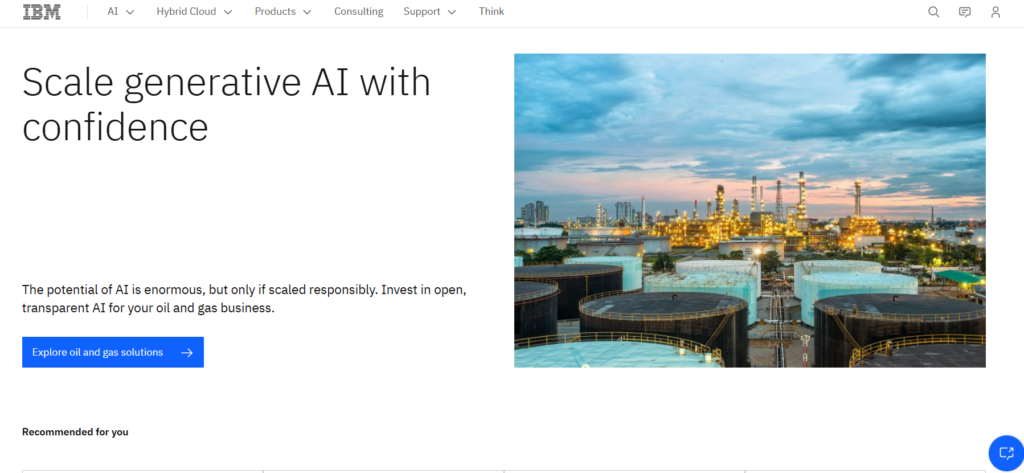
Source: IBM
Founded: 1911
Headquarters: Armonk, New York
Generative AI Products:
- Watsonx: IBM’s AI and data platform designed to assist businesses in scaling and accelerating AI workloads. It comprises three main components
- Watsonx.ai: A studio offering access to a range of large language models (LLMs), including IBM’s own Granite series, facilitating tasks such as content generation, summarization, and natural language processing.
- Watsonx.data: A data store designed to manage and optimize data for AI workloads, ensuring seamless data access and governance.
- Watsonx.governance: A toolkit to help organizations oversee and regulate their AI models, ensuring compliance and mitigating risks associated with AI deployment.
Industry Impact:
- Domain Transformation: Empowering enterprises to harness AI for various applications, from automating processes to enhancing decision-making, thereby driving innovation across sectors.
- Catering To: Diverse industries including finance, healthcare, telecommunications, and more, by providing AI solutions that enhance operational efficiency and customer engagement.
Strategic Focus:
IBM’s substantial investment in AI patents underscores its strategic focus on AI as a key area for innovation. The company’s dedication to AI research is evident in its consistent patent leadership and development of foundational AI technologies like the Granite models.
Legal Considerations:
The evolving landscape of AI has prompted legal discussions regarding intellectual property rights. Recent rulings, such as the U.S. Supreme Court’s decision not to hear a challenge to the Patent and Trademark Office’s refusal to issue patents for AI-generated inventions, highlight the complexities in patenting AI innovations. These developments may influence future patent strategies within the AI industry.
IBM’s leadership in AI patents and its ongoing commitment to AI research position the company at the forefront of AI innovation, addressing both technological advancements and the legal challenges associated with AI development.
#9. Salesforce
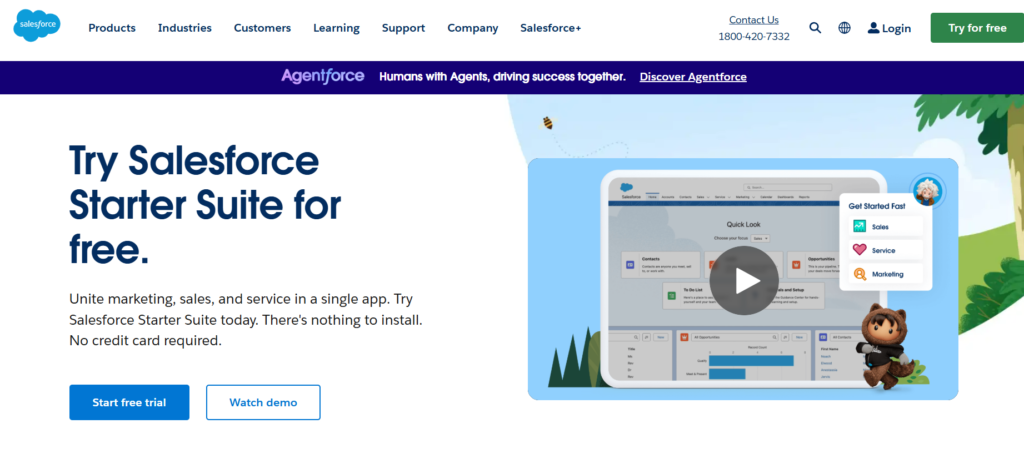
Source: Salesforce
Founded: 1999
Headquarters: San Francisco, California
Generative AI Products:
- Einstein GPT: An AI-powered customer relationship management (CRM) system that integrates generative AI to enhance customer interactions, automate tasks, and provide data-driven insights.
Industry Impact:
- Domain Transformation: Revolutionizing the CRM domain by embedding AI capabilities, allowing businesses to engage more effectively with customers.
- Catering To: Various industries including retail, finance, healthcare, and more, by providing tailored AI solutions to improve customer engagement and operational efficiency.
Patent Information:
Salesforce has been actively patenting technologies related to AI. As of Q4 2023, the company filed patents for technologies such as generating interactive emails, zero-shot visual question answering, and training prompt generators for text classification.
Salesforce’s commitment to integrating generative AI into its products underscores its leadership in driving innovation within the CRM industry.
Salesforce has been actively developing and patenting generative artificial intelligence (AI) technologies to enhance its customer relationship management (CRM) solutions. Here are some notable AI-related patents and initiatives from Salesforce:
Customizable Generative AI Platform:
This patent describes systems for building a customized generative AI platform tailored to individual business needs. It allows businesses to design AI applications specific to their requirements, utilizing internal data to enhance accuracy while maintaining data privacy. The system also facilitates easy integration with various AI models, including those from external providers.
Multilingual AI Capabilities:
Salesforce’s patent application focuses on multilingual AI systems designed to enhance global customer experiences. The technology aims to break language barriers by providing AI-driven translation and localization services within Salesforce’s platforms, ensuring consistent and personalized customer interactions across different languages.
Orchestrating AI Agents:
This patent outlines a system for orchestrating language model-augmented autonomous agents. It involves coordinating and selecting the most appropriate AI agent for specific tasks, ensuring efficient and accurate task execution. The system addresses challenges related to agent performance and task management within AI-driven environments.
These patents reflect Salesforce’s commitment to integrating advanced generative AI capabilities into its CRM solutions, aiming to enhance personalization, multilingual support, and efficient AI agent management for businesses worldwide.
#10. Adobe

Source: Adobe
Founded: 1982
Headquarters: San Jose, California
Generative AI Products:
- Adobe Firefly: A suite of generative AI models integrated into Adobe’s Creative Cloud applications, enabling users to generate images, text effects, and more through simple text prompts.
Industry Impact:
- Domain Transformation: Simplifying and accelerating the creative process for designers, marketers, and content creators by providing AI-driven tools that enhance creativity and productivity.
- Catering To: Creative industries, marketing, advertising, and media sectors, offering tools that streamline content creation and design workflows.
Patent Information:
Adobe holds numerous patents in digital media and creative software, including technologies related to AI-driven content creation.
Adobe’s integration of generative AI into its Creative Cloud applications underscores its commitment to empowering creatives with innovative tools that enhance their workflows.
Adobe has actively engaged in developing generative artificial intelligence (AI) technologies, leading to several notable patent applications aimed at enhancing its suite of creative products and services.
Strategic Focus and Ethical Considerations:
Adobe’s patent activities underscore a strategic focus on integrating generative AI to enhance user creativity and productivity. The company has also addressed ethical considerations in AI usage, establishing guidelines that prohibit the use of generative AI features for training external AI models and emphasizing respect for third-party rights.
These guidelines are designed to maintain the integrity of generated content and foster a trustworthy creative environment.
Through these initiatives, Adobe demonstrates a commitment to advancing generative AI technologies while addressing the ethical and practical challenges associated with their deployment in creative applications.
#11. Cohere
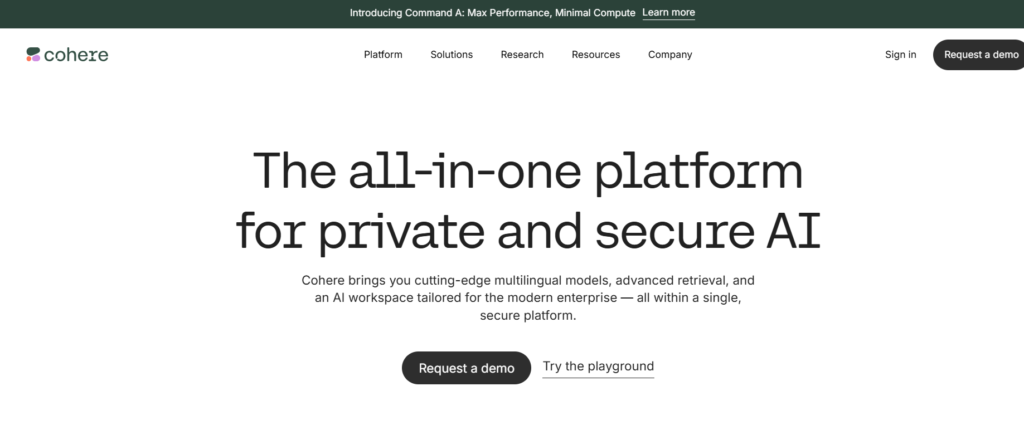
Source: Cohere
Founded: 2019
Headquarters: Toronto, Canada
Generative AI Products:
- Command R: A retrieval-augmented generation (RAG) large language model optimized for tasks requiring real-time data retrieval, enhancing the accuracy and relevance of generated content.
- Coral: A series of multilingual language models designed to understand and generate text across multiple languages, facilitating global business communications and content creation.
Industry Impact:
- Domain Transformation: Advancing natural language understanding and generation capabilities, enabling businesses to implement more effective AI-driven communication tools and services.
- Catering To: Various sectors including customer service, content creation, and multilingual communication, by providing advanced language models that support diverse linguistic needs.
Notable Cohere Patents in Generative AI:
US20230177279A1 – System and Method for Training Language Models Using Already Trained Language Models
This patent outlines methods for initializing a second language model using weights from a first, pre-trained model, facilitating efficient model training and deployment.
US20230057387A1 – System and Method for Low Rank Training of Neural Networks
The patent describes techniques for factorizing neural network nodes to create low-rank models, aiming to enhance computational efficiency without sacrificing performance.
US20220414467A1 – System and Method for Filtering Datasets Using Conditional likelihood Filtration
This patent presents methods for generating trained models to filter datasets, specifically targeting the identification and removal of hate speech, thereby improving dataset quality.
These patents reflect Cohere’s dedication to advancing AI technologies, particularly in the realms of language modeling and neural network optimization.
#13. Hugging Face
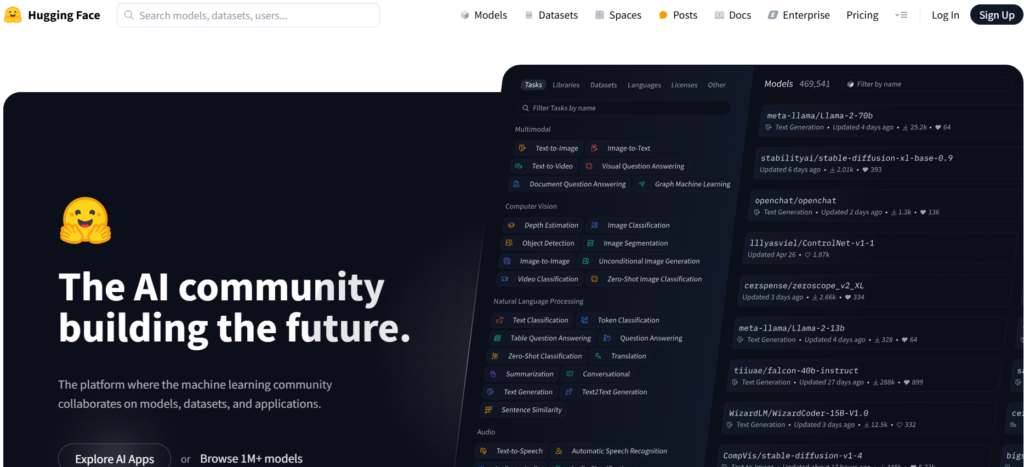
Source: Hugging Face
Founded: 2016
Headquarters: New York City, New York
Generative AI Products:
- Transformers Library: An open-source library offering thousands of pre-trained models for natural language processing (NLP), computer vision, and more, facilitating tasks like text generation, translation, and summarization.
Industry Impact:
- Domain Transformation: Empowering developers and researchers by providing accessible AI tools and models, accelerating innovation and application development across various sectors.
- Catering To: Technology, research, education, and enterprise sectors, enabling the integration of advanced AI capabilities into diverse applications.
Patent Information:
Specific patent details for Hugging Face’s technologies are not publicly disclosed.
Hugging Face’s commitment to open-source AI tools has democratized access to advanced models, fostering collaboration and rapid development in the AI community.
Hugging Face, a prominent AI company specializing in natural language processing (NLP), has actively contributed to the development of AI technologies, particularly in the realm of patent-related NLP applications. While Hugging Face primarily focuses on providing open-source tools and models, it has also engaged in legal matters pertaining to patent rights within the AI industry.
Patent-Related Initiatives:
PatentSBERTa Model:
Developed in collaboration with Aalborg University Business School’s AI: Growth-Lab, PatentSBERTa is a deep NLP model designed to assess patent similarity and classification. It leverages augmented SBERT (Sentence-BERT) techniques to map sentences and paragraphs to dense vector spaces, facilitating efficient clustering and semantic search within patent databases.
BERT for Patents Model:
This model, trained by Google on a dataset exceeding 100 million patents globally, is based on BERT LARGE architecture. It is fine-tuned to enhance understanding and processing of patent-related texts, supporting tasks such as patent classification and semantic analysis.
Legal Engagements:
Settlement with FriendliAI:
Background: In July 2023, FriendliAI, a Korean AI startup, filed a lawsuit against Hugging Face, alleging infringement of its batching method patent (U.S. Patent No. 11,442,775). The patent pertains to a technology that improves the batching process of data fed into AI systems, enabling the handling of multiple requests simultaneously. In December 2024, Hugging Face and FriendliAI reached a confidential settlement, resulting in the dismissal of the lawsuit. The terms of the agreement were not publicly disclosed.
These developments highlight Hugging Face’s involvement in both advancing AI technologies for patent applications and navigating the complex landscape of intellectual property rights within the AI sector.
#14. Mistral AI
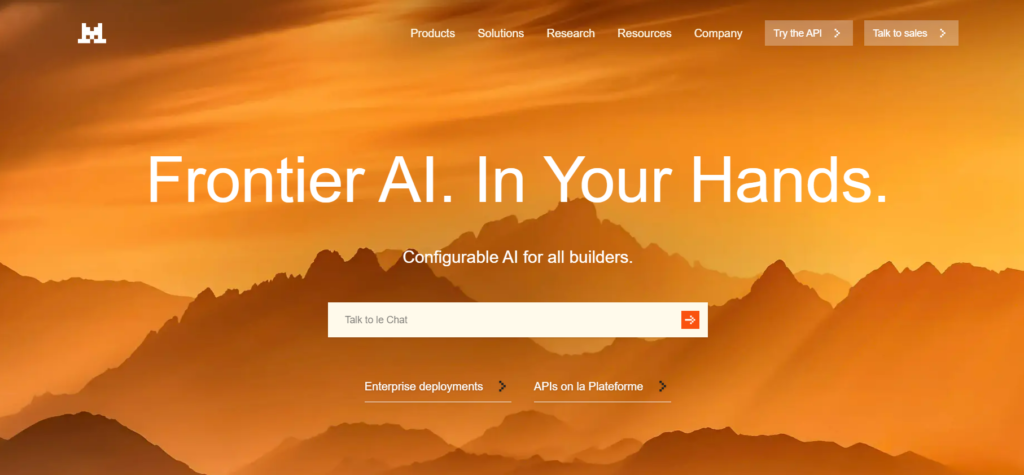
Source: Mistral AI
Founded: 2023
Headquarters: Paris, France
Generative AI Products:
- Mistral Models: Developing open-weight large language models (LLMs) designed to perform a variety of natural language processing tasks, including text generation, summarization, and translation.
Industry Impact:
- Domain Transformation: Aiming to democratize access to advanced AI models by providing open-weight LLMs, fostering innovation and enabling integration of AI capabilities across various applications.
- Catering To: Technology companies, research institutions, and developers seeking to incorporate advanced language understanding and generation into their products and services.
Recent Developments:
- Mistral OCR: Launched in March 2025, Mistral OCR is an advanced optical character recognition API designed to convert printed and scanned documents into digital formats with high accuracy. It supports multiple languages and complex document structures, including tables and mathematical equations.
- Partnership with Qualcomm: In October 2024, Mistral AI partnered with Qualcomm to integrate its advanced generative AI models into devices powered by Snapdragon and Qualcomm platforms, aiming to enhance AI capabilities on mobile and edge devices.
Patents and Intellectual Property:
As of March 2025, Mistral AI has not publicly disclosed any patent filings. The company maintains a strong commitment to open-source principles, releasing many of its models with open weights under the Apache 2.0 license. This approach encourages community collaboration and rapid advancement in generative AI technologies.
While Mistral AI has not pursued patents for its technologies, it actively engages in collaborations and partnerships to expand the reach and impact of its AI solutions.
#15. Aleph Alpha
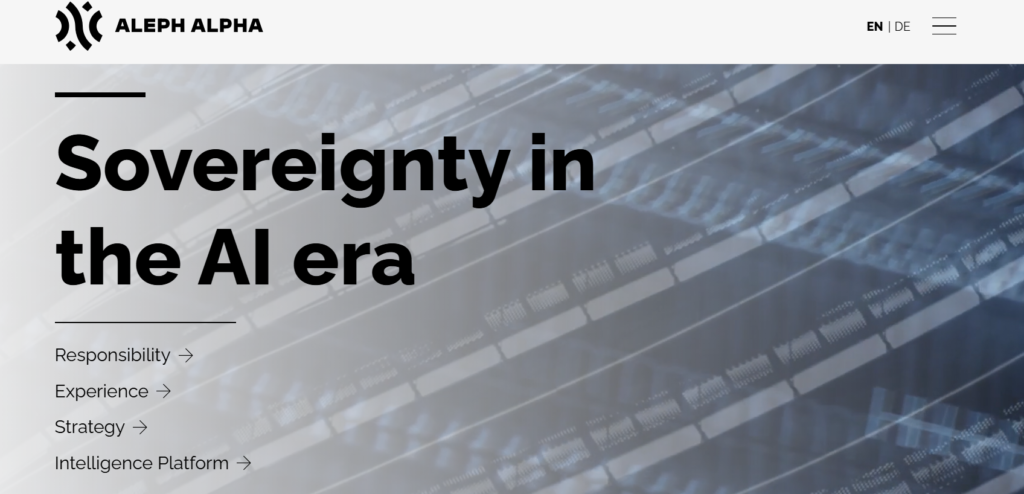
Source: Aleph Alpha
Founded: 2019
Headquarters: Heidelberg, Germany
Generative AI Products:
- Luminous: A series of large language models (LLMs) trained in multiple European languages, designed to provide transparent and interpretable AI solutions for enterprises and governmental agencies.
Industry Impact:
- Domain Transformation: Developing sovereign AI technologies that comply with European data protection regulations, aiming to reduce dependency on non-European AI providers and enhance data sovereignty.
- Catering To: Various sectors including public administration, healthcare, and finance, offering AI solutions that emphasize transparency, security, and compliance with European standards.
Key Developments:
- PhariaAI Platform: In August 2024, Aleph Alpha launched PhariaAI, an enterprise-grade operating system for generative AI. PhariaAI offers a comprehensive suite of tools designed to integrate AI seamlessly into business processes, ensuring transparency, compliance, and control. It supports hybrid execution environments, allowing deployment both on-premises and in the cloud, and includes features for model explainability and auditability.
- Pharia-1-LLM Models: Alongside the PhariaAI platform, Aleph Alpha introduced the Pharia-1-LLM series, including models like Pharia-1-LLM-7B-control and Pharia-1-LLM-7B-control-aligned. These models are optimized for concise, length-controlled responses and are culturally and linguistically attuned to German, French, and Spanish. They are trained on multilingual datasets, ensuring compliance with EU and national regulations, including copyright and data privacy laws.
Intellectual Property:
While specific patent holdings of Aleph Alpha are not publicly detailed, the company emphasizes proprietary innovations in its AI models and platforms. Aleph Alpha is committed to maintaining sovereignty in AI development, ensuring that its technologies comply with European data protection standards and provide transparency in AI operations.
Aleph Alpha continues to position itself at the forefront of AI innovation in Europe, focusing on delivering advanced, compliant, and transparent AI solutions to meet the complex needs of enterprises and governmental entities.
#16. Replit
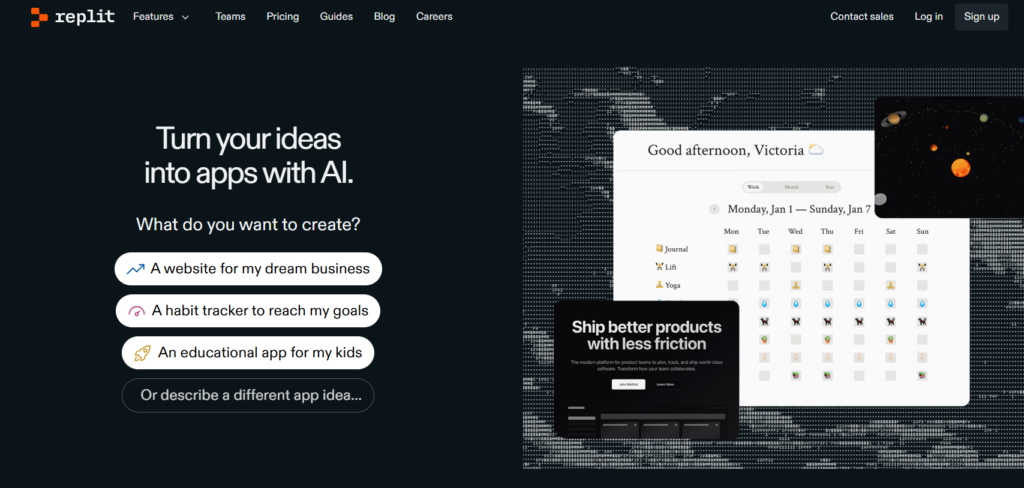
Source: Replit
Founded: 2016
Headquarters: San Francisco, California
Generative AI Products:
- Ghostwriter: An AI-powered coding assistant integrated into Replit’s development environment, offering code suggestions, autocompletion, and debugging assistance to streamline the coding process.
Industry Impact:
- Domain Transformation: Enhancing software development by providing AI-driven tools that improve coding efficiency, reduce errors, and accelerate the development lifecycle.
- Catering To: Individual developers, educational institutions, and enterprises seeking to optimize their software development workflows with intelligent coding assistance.
Patent Information:
Replit, a platform designed to simplify coding and app development, has integrated artificial intelligence (AI) into its services to enhance user experience. In November 2024, Replit was granted U.S. Patent No. 12,141,554 for “Intelligent and predictive modules for software development and coding using artificial intelligence and machine learning.” This patent covers AI tools that assist in writing computer code by predicting subsequent code entries based on user input, streamlining the coding process.
Beyond this patent, Replit has developed AI-powered features such as Replit Agent and Replit Assistant. Replit Agent enables users to generate applications and websites from natural language prompts, effectively acting as an automated app developer. Replit Assistant offers functionalities like code explanations and debugging assistance, making coding more accessible to both novice and experienced developers.
Replit’s commitment to integrating AI into its platform reflects a broader trend in the tech industry toward enhancing software development tools with intelligent features, aiming to make coding more efficient and user-friendly.
#17. Oracle
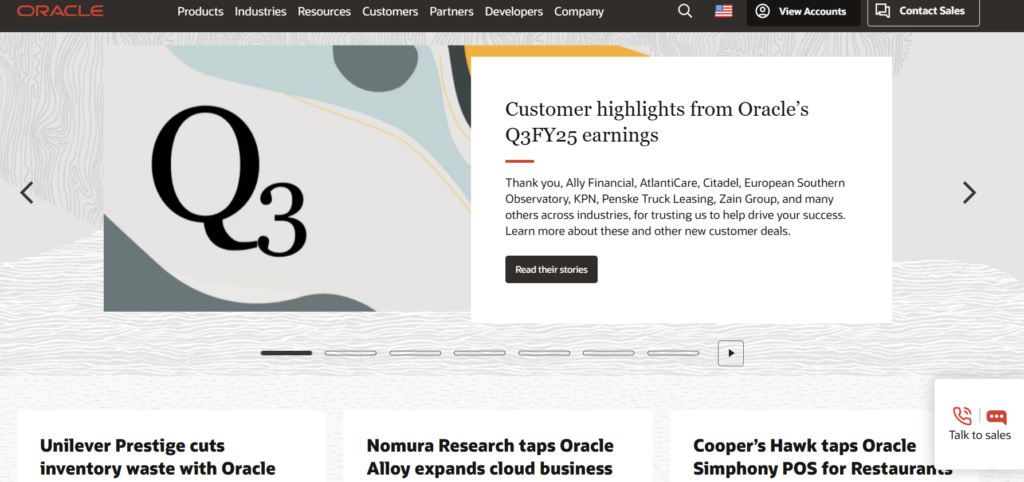
Source: Oracle
Founded: 1977
Headquarters: Austin, Texas
Generative AI Products:
- Oracle AI: A suite of AI services integrated into Oracle Cloud Infrastructure (OCI), offering pre-trained models and tools for building and deploying AI applications.
Industry Impact:
- Domain Transformation: Enhancing enterprise operations by integrating AI capabilities into cloud services, databases, and applications, thereby improving data analysis, automation, and decision-making processes.
- Catering To: Various sectors including finance, healthcare, retail, and manufacturing, by providing scalable AI solutions that optimize business processes and drive innovation.
Patent Information:
Oracle holds numerous patents in database management and cloud computing technologies, including advancements related to AI and machine learning.
Notable patents include:
US20250068626A1: Techniques for Manufacturing Training Data to Transform Natural Language into a Visualization Representation
This patent describes methods for creating training datasets that enable machine learning models to convert natural language inputs into visual representations. The techniques involve modifying existing datasets and generating new examples to include visualization actions, enhancing the model’s ability to interpret and visualize data based on natural language commands.
US20240012345A1: Automated Machine Learning Counterfactual Explainer (autoMLX)
This patent focuses on providing counterfactual explanations for machine learning model outcomes. The system aims to help users understand why a model produced a particular inference by illustrating minimal changes to input data that could lead to different outcomes, thereby enhancing transparency and aiding decision-making processes.
US20240067890A1: Machine Learning Model Attack Guard
This patent addresses the security of machine learning models hosted in cloud environments. It proposes a system that prevents users from reverse-engineering sensitive training data by deploying a “shadow model” similar to the original. This approach safeguards against potential attacks aiming to extract confidential information from AI models.
Oracle’s integration of generative AI into its cloud infrastructure demonstrates its commitment to providing robust AI solutions that empower businesses across multiple industries.
#18. Apple
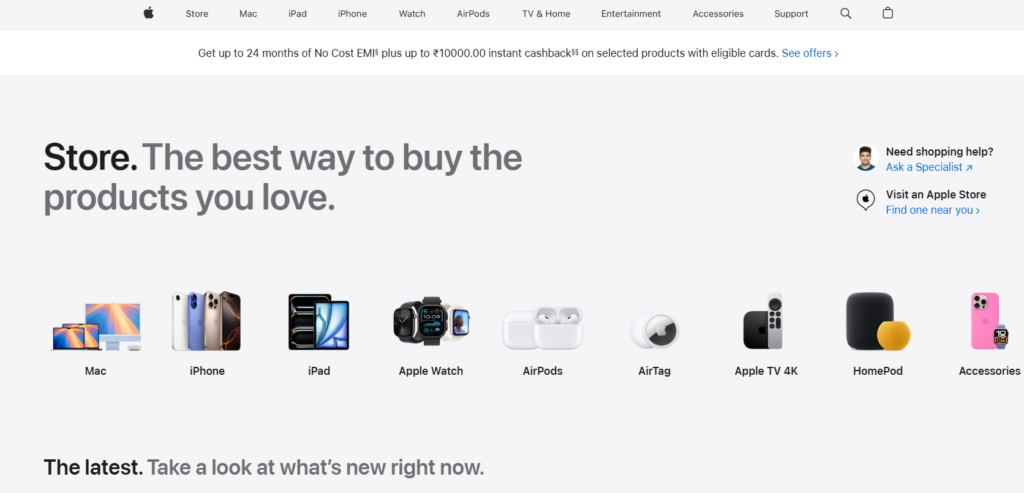
Source: Apple
Founded: 1976
Headquarters: Cupertino, California
Generative AI Products:
- Siri Enhancements: Apple has been integrating generative AI capabilities into Siri, aiming to provide more natural and context-aware interactions.
- Developer Tools: Apple offers machine learning and AI development tools, such as Core ML and Create ML, enabling developers to incorporate AI functionalities into their applications.
Industry Impact:
- Domain Transformation: Enhancing user experience across Apple devices by integrating AI for personalized services, improved voice recognition, and intelligent assistance.
- Catering To: Consumer electronics, software development, and services sectors, providing AI-driven features that enhance device functionality and user engagement.
Patent Information:
Apple holds numerous patents related to AI and machine learning technologies, reflecting its ongoing commitment to innovation in this field.
Apple’s integration of generative AI into its products and services underscores its dedication to enhancing user experiences and maintaining its competitive edge in the technology industry.
#19. Palantir Technologies
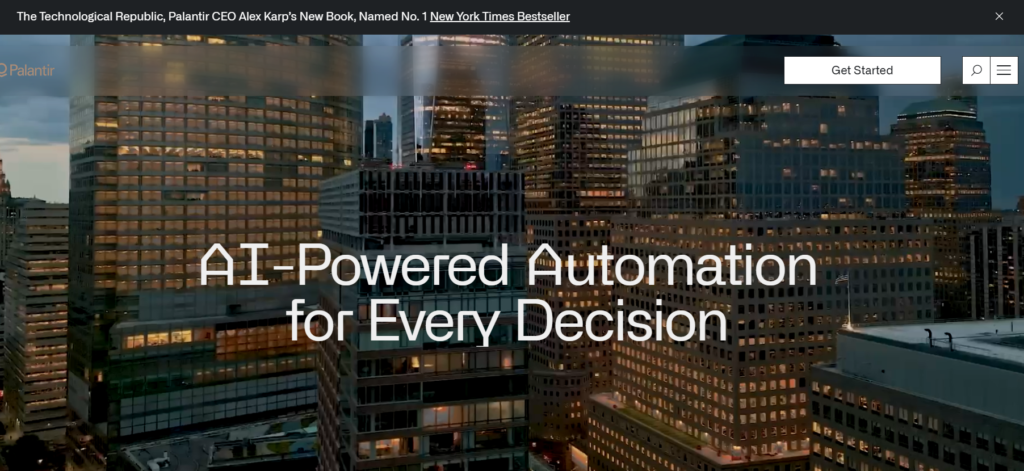
Source: Palantir
Founded: 2003
Headquarters: Denver, Colorado
Generative AI Products:
- Artificial Intelligence Platform (AIP): Integrates large language models (LLMs) into defense and military systems, enabling natural language interactions with complex datasets.
Industry Impact:
- Domain Transformation: Enhancing data analysis and decision-making processes within defense sectors by enabling more intuitive data interactions.
- Catering To: Defense, intelligence, and governmental organizations requiring advanced data analytics and AI capabilities.
Patent Information:
Palantir holds several patents related to data analysis and AI technologies.
Palantir’s AIP exemplifies its commitment to integrating generative AI into critical sectors, enhancing operational efficiency and strategic decision-making.
#20. Grammarly
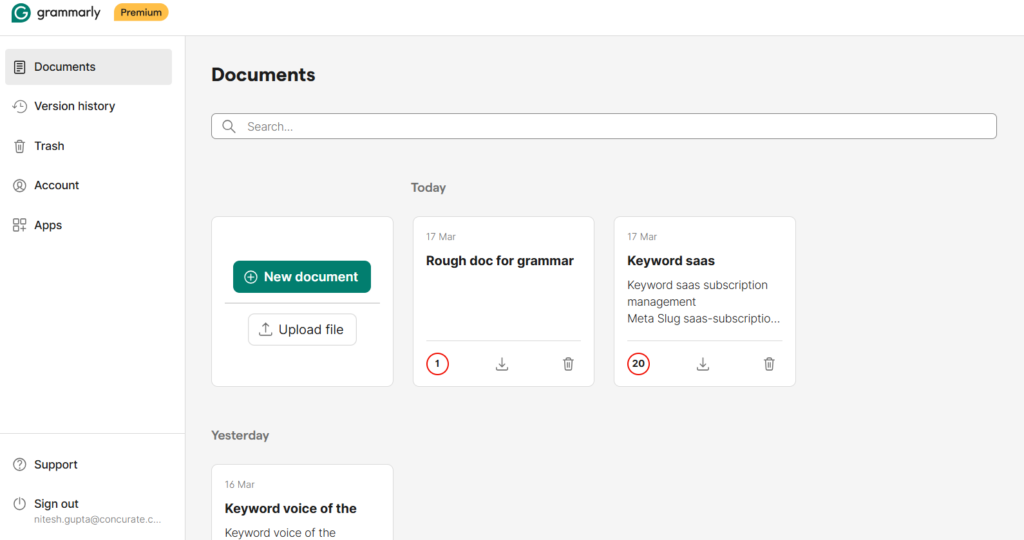
Source: Grammarly
Founded: 2009
Headquarters: San Francisco, California
Generative AI Products:
- GrammarlyGO: An AI-powered writing assistant that offers real-time grammar checking, style improvements, and context-specific suggestions to enhance clarity and engagement in writing.
Industry Impact:
- Domain Transformation: Revolutionizing digital writing by providing AI-driven tools that assist users in crafting clear, effective, and error-free content.
- Catering To: Various sectors including education, business, and personal communication, by offering tools that improve written communication across platforms.
Grammarly, Inc., a leading provider of AI-driven writing assistance tools, has developed several notable patents to enhance written communication. Here are three key patents:
US12166809B2: Artificial Intelligence Communication Assistance
This patent focuses on systems and methods that utilize artificial intelligence to assist users in composing electronic communications. It aims to improve the effectiveness and clarity of written content by providing real-time suggestions and corrections.
Patent Litigation Involving Grammarly:
Grammarly has been involved in patent litigation cases, including:
- Syslore Oy v. Grammarly, Inc.: In August 2020, Syslore Oy filed a lawsuit against Grammarly in the Delaware District Court, alleging patent infringement related to text processing technologies. The case was terminated in February 2021.
- Safe IP LLC v. Grammarly, Inc.: In July 2022, Safe IP LLC initiated a patent infringement lawsuit against Grammarly in the Delaware District Court. The case was voluntarily dismissed by Safe IP LLC in September 2022.
These instances reflect the complex landscape of intellectual property rights within the technology sector, highlighting the challenges companies like Grammarly may face in protecting and defending their innovations.
Grammarly’s integration of generative AI into its writing assistant tools exemplifies its commitment to enhancing written communication through advanced technology.
#21. Jasper AI
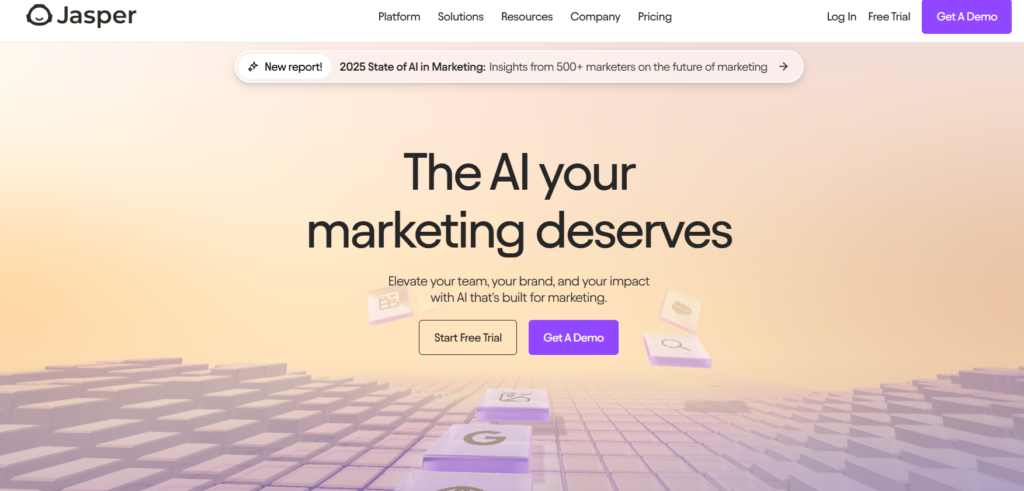
Source: Jasper AI
Founded: 2021
Headquarters: Austin, Texas
Generative AI Products:
- Jasper AI Platform: Offers AI-driven content generation tools that assist in creating marketing copy, blog posts, and other written materials, streamlining the content creation process for businesses and individuals.
Industry Impact:
- Domain Transformation: Revolutionizing the content creation industry by providing tools that enhance writing efficiency and creativity, allowing marketers and writers to produce high-quality content more rapidly.
- Catering To: Marketing, advertising, and content creation sectors, enabling professionals to generate compelling copy and creative content with the assistance of AI.
Jasper AI’s platform exemplifies the practical applications of generative AI in enhancing content creation and marketing strategies.
#22. Stability AI
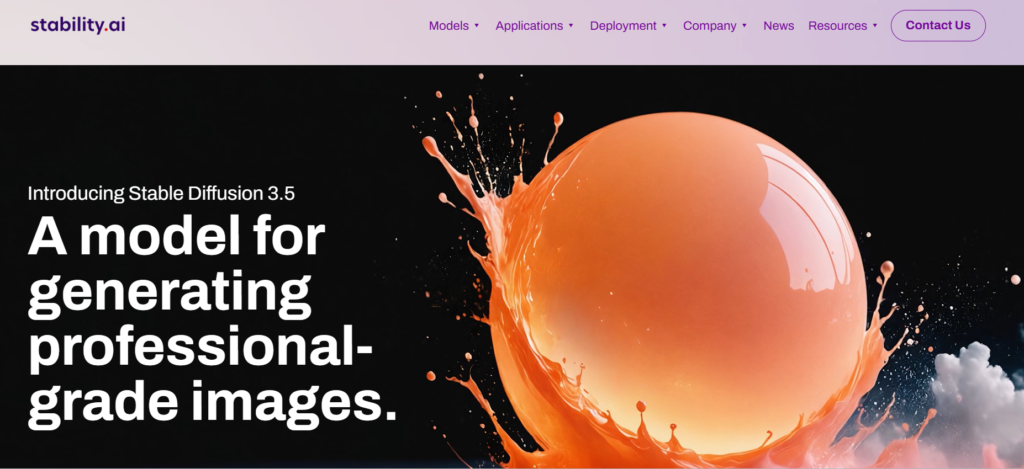
Source: Stability
Founded: 2020
Headquarters: San Francisco, California
Generative AI Products:
- Stable Diffusion: An open-source AI model capable of generating detailed images from textual descriptions, widely used for creative and artistic applications.
Industry Impact:
- Domain Transformation: Democratizing access to advanced image generation tools, enabling artists, designers, and developers to create visual content more efficiently.
- Catering To: Creative industries, advertising, entertainment, and any sector requiring rapid and cost-effective image creation.
Stability AI’s development of Stable Diffusion has significantly impacted the creative process, providing accessible tools for high-quality image generation.
#23. C3.ai
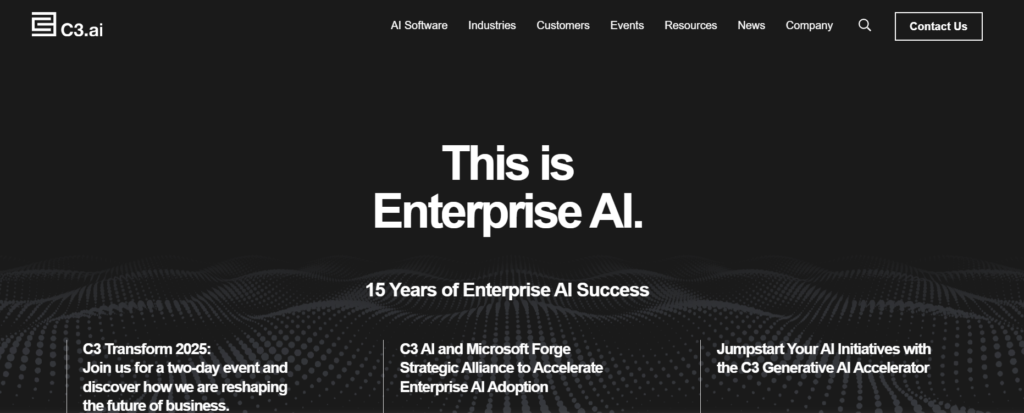
Source: C3
Founded: 2009
Headquarters: Redwood City, California
Generative AI Products:
- C3 Generative AI Suite: Provides enterprise AI applications across various industries, enabling organizations to leverage AI for predictive analytics, process optimization, and decision support.
Industry Impact:
- Domain Transformation: Assisting enterprises in adopting AI to enhance operational efficiency, reduce costs, and improve decision-making processes.
- Catering To: Sectors such as manufacturing, energy, healthcare, and financial services, offering tailored AI solutions to meet industry-specific challenges.
Patent Information:
C3.ai holds several patents related to AI and machine learning technologies, reflecting its commitment to innovation in enterprise AI solutions.
C3.ai’s focus on delivering AI applications across diverse industries showcases its role in driving digital transformation and operational excellence.
#24. GitHub
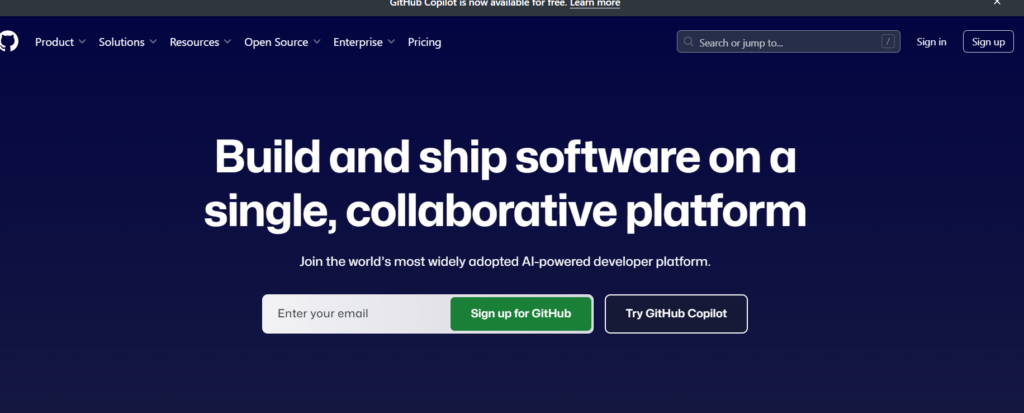
Source: GitHub
Founded: 2008
Headquarters: San Francisco, California
Generative AI Product:
- GitHub Copilot: An AI-powered coding assistant developed in collaboration with OpenAI, integrated into code editors to provide real-time code suggestions, autocompletion, and function recommendations, thereby enhancing developer productivity.
Industry Impact:
- Domain Transformation: Revolutionizing software development by integrating AI into coding environments, reducing the time required for code writing and debugging, and assisting developers in learning new coding patterns and languages.
- Catering To: Software development, technology startups, educational institutions, and enterprises seeking to improve coding efficiency and streamline development workflows.
GitHub’s Copilot exemplifies the integration of generative AI into software development, providing developers with intelligent tools that enhance coding efficiency and learning.
#25. Synthesia
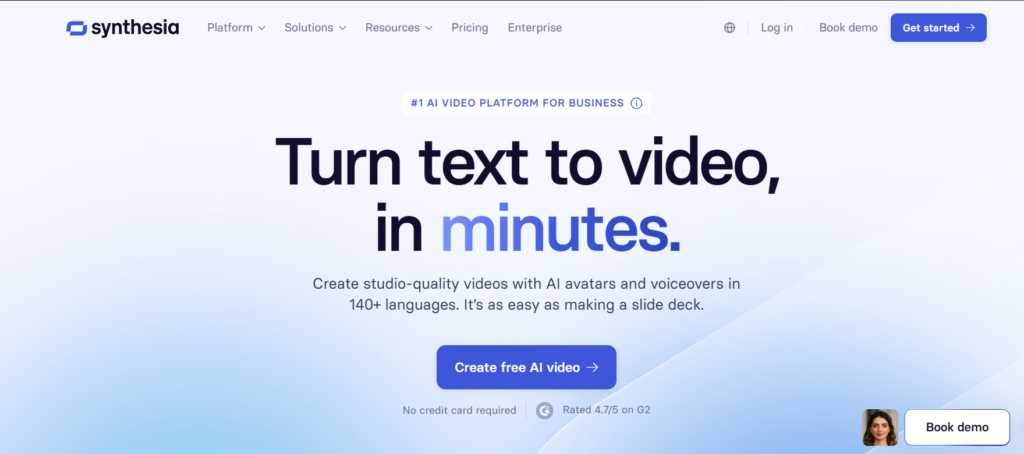
Source: Synthesia
Founded: 2017
Headquarters: London, United Kingdom
Generative AI Products:
- AI Video Platform: Allows users to create videos from plain text in minutes, utilizing generative AI to produce lifelike human faces and speech.
Industry Impact:
- Domain Transformation: Revolutionizing media production by enabling rapid, cost-effective video content creation without the need for cameras or studios.
- Catering To: Marketing, training, and corporate communications sectors, providing tools to generate engaging video content at scale.
Synthesia’s innovative approach to video content creation has positioned it as a leader in the generative AI media landscape.
#26. LightOn
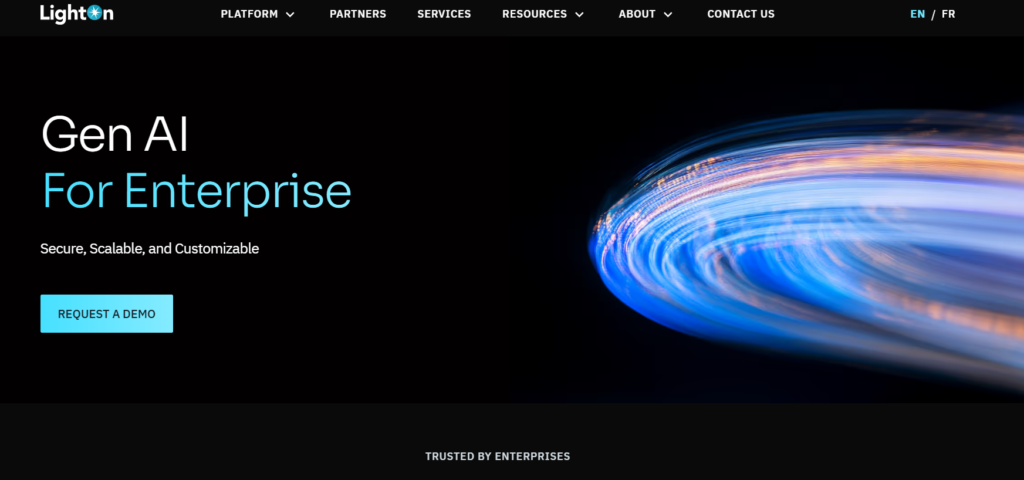
Source: LightOn
Founded: 2016
Headquarters: Paris, France
Generative AI Products:
- Optical Processing Unit (OPU): A hardware solution designed to accelerate AI computations using optical processing, enhancing the efficiency of large-scale data tasks, including large language models.
- Large Language Models (LLMs): Since 2020, LightOn has developed 12 LLMs, providing advanced natural language processing capabilities for various applications.
Industry Impact:
- Domain Transformation: Pioneering the integration of optical processing in AI, leading to more efficient data processing and the advancement of AI applications across sectors.
- Catering To: Various industries, including public sector entities like the Île-de-France region and the French Space Agency (CNES), as well as private companies such as Safran and Groupama, by offering AI solutions that enhance data processing and decision-making.
Patent Information:
LightOn, a French company specializing in optical computing and artificial intelligence, has developed several notable patents that integrate optical systems with machine learning techniques. Here are three key patents:
US11574178B2: Method and System for Machine Learning Using Optical Data
This patent describes a system comprising an optical source, an adjustable spatial light modulator, a medium, and an optical detector. The system utilizes optical signals transmitted through the medium at various spatial light modulations to train an electronic model using synthetic gradients based on these optical signals.
US11313667B2: Methods for the Stabilization of Interferometric Systems and Interferometric Systems Implementing Such Methods
This patent focuses on a stabilized interferometric system that includes a light source emitting a coherent light beam, a spatial light modulator receiving input data, a scattering medium, and a detection unit acquiring interference patterns. The system adjusts the frequency of the laser source to compensate for changes in environmental parameters affecting the interference pattern.
US11137289B2: Method and System for Machine Learning Using Optical Data
This patent outlines a system with an optical source, an adjustable spatial light modulator, a medium, a beam splitter generating first and second optical signals, and an optical detector obtaining combined optical signals. The system uses these signals to train an electronic model, enhancing machine learning processes through optical data.
These patents highlight LightOn’s innovative approach to integrating optical technologies with machine learning, aiming to enhance data processing capabilities and computational efficiency.
LightOn’s innovative approach to AI hardware and software positions it as a leading European player in the generative AI landscape
#27. Peak AI
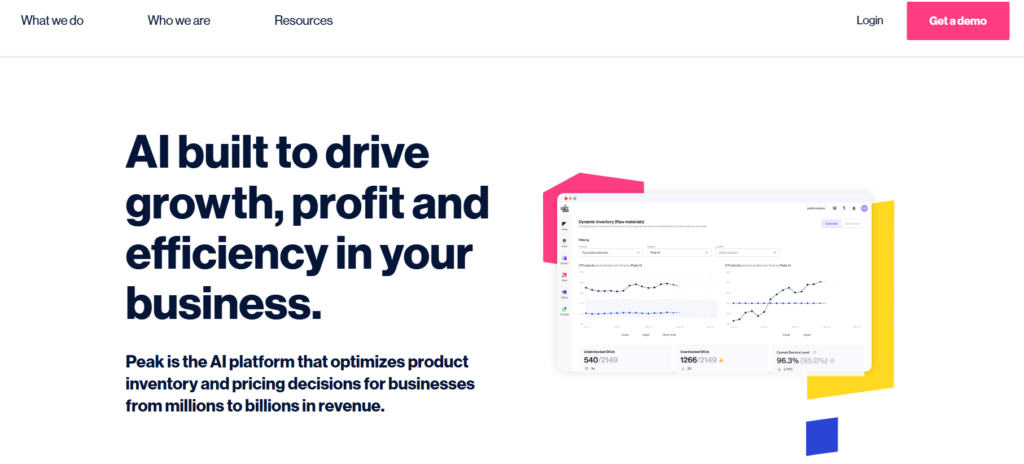
Source: Peak
Founded: 2015
Headquarters: Manchester, United Kingdom
Generative AI Products:
- Decision Intelligence Platform: Utilizes AI to assist businesses with product inventory management and pricing strategies, enhancing operational efficiency and decision-making processes.
Industry Impact:
- Domain Transformation: Integrating AI into business operations to optimize inventory levels, pricing, and overall supply chain management, thereby improving profitability and customer satisfaction.
- Catering To: Retail, manufacturing, and consumer goods sectors, with notable clients including Nike, KFC, and Superdry.
Peak AI’s innovative application of AI in decision intelligence has positioned it as a valuable partner for businesses aiming to enhance efficiency and competitiveness. In March 2025, Peak AI was acquired by American company UiPath, aiming to accelerate the integration of AI in business processes.
#28. Metaphysic.ai
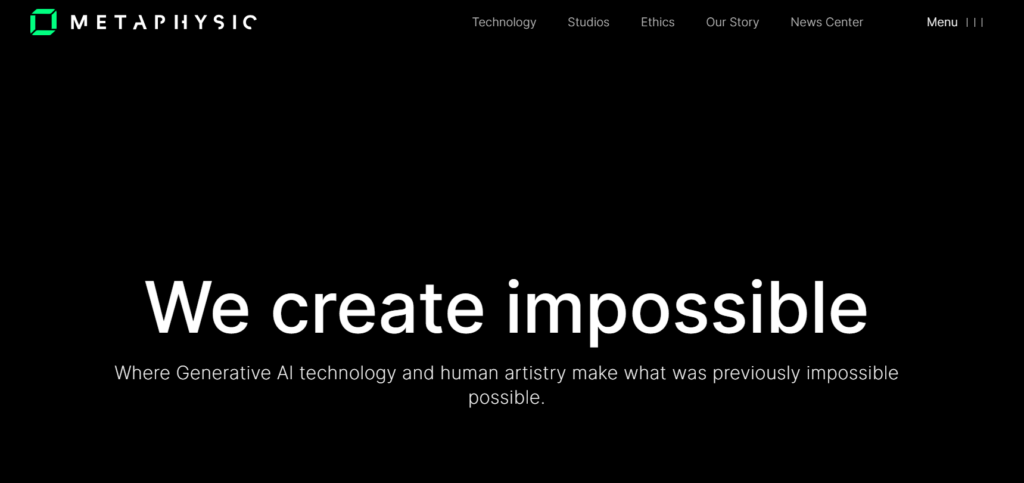
Source: Metaphysic
Founded: 2021
Headquarters: London, United Kingdom
Generative AI Products:
- Hyperreal AI Content Creation Tools: Develops advanced AI tools that enable the creation of hyperrealistic synthetic media, including lifelike face synthesis and editing, facilitating high-quality visual content production.
Industry Impact:
- Domain Transformation: Pioneering the field of synthetic media by providing tools that allow for the creation of realistic digital content, impacting entertainment, advertising, and social media industries.
- Catering To: Entertainment, advertising, and media production sectors seeking innovative methods for content creation and audience engagement.
Metaphysic.ai’s advancements in generative AI for hyperrealistic content creation position it as a leader in the emerging field of synthetic media.
#29. Helsing

Source: Helsing
Founded: 2021
Headquarters: Munich, Germany
Generative AI Products:
- AI Defense Systems: Develops advanced AI technologies to enhance defense capabilities, focusing on real-time data analysis, threat detection, and decision support systems for military applications.
Industry Impact:
- Domain Transformation: Integrating AI into defense strategies to improve situational awareness, operational efficiency, and strategic decision-making processes.
- Catering To: Defense and national security sectors, providing AI-driven solutions to modernize military operations and enhance defense mechanisms.
Notable Patent Application:
EP4365779A1: Method and Devices for Monitoring Performance Data of an AI Model
This European patent application, published in May 2024, details methods and devices for monitoring performance data of AI models deployed on platforms. It focuses on determining performance criteria, comparing monitored data to these criteria, and triggering alerts based on the comparisons. The aim is to improve automated performance monitoring and problem detection within systems utilizing AI models.
Recent Developments:
- Collaboration with Mistral AI: Helsing has partnered with Mistral AI to jointly develop AI systems for military applications, aiming to enhance defense capabilities through advanced AI technologies.
- Commissioned for AI Backbone in FCAS: Helsing, in consortium with IBM and Rohde & Schwarz, has been selected to provide the AI development infrastructure for the Future Combat Air System (FCAS), contributing to high-performance AI platforms in defense.
These developments underscore Helsing’s commitment to integrating AI into defense systems, enhancing operational efficiency and strategic capabilities.
Generative AI Companies are Defining the Future. What Next?
The 29 most innovative generative AI companies across the US and Europe are shaping the next era of artificial intelligence. From OpenAI and DeepMind to Mistral AI and Hugging Face, these companies are developing models that write, code, design, and create. They are redefining how businesses and individuals interact with technology.
But in such a fast-moving space, how do we separate real breakthroughs from fleeting trends?
Patents offer a critical signal. They reveal where companies are investing in AI research, which innovations are being protected, and how technology is evolving across different sectors.
This is where the Global Patent Search Tool becomes indispensable. Unlike conventional patent databases, this AI-powered tool goes beyond simple keyword searches to:
- Identify prior art and related patents by analyzing an idea description.
- Find patents by priority date, mapping AI innovation timelines.
- Break down specific patent features and match them to existing technologies.
- Track generative AI advancements across different industries.
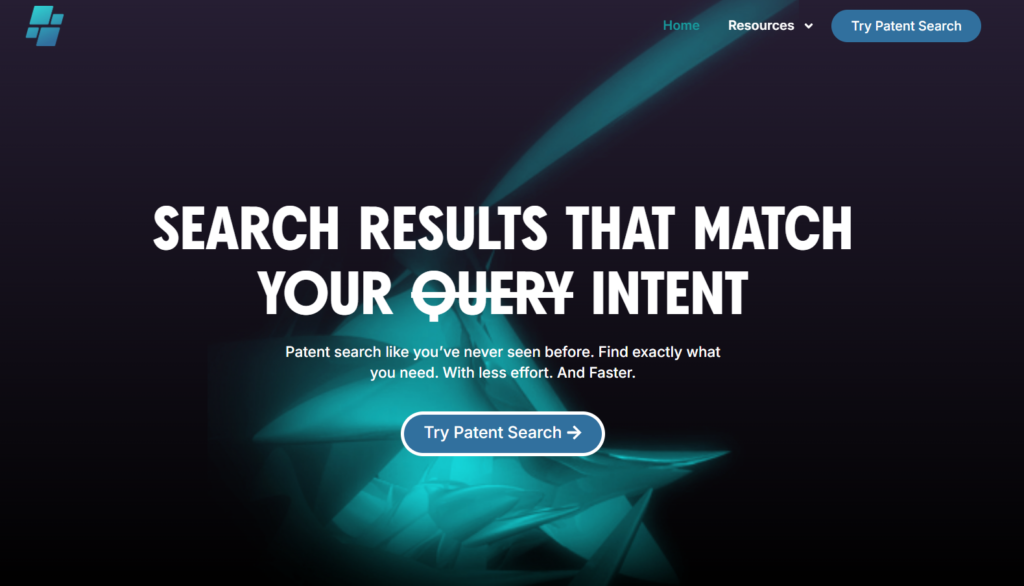
For business leaders, researchers, and investors, understanding AI patents means staying ahead of the curve; spotting industry trends before they hit the mainstream.
Want to see who’s shaping the future of generative AI? Start exploring AI patents with the Global Patent Search Tool today.
Recommended Read: The Top 23 Generative AI Companies in Asia Leading the AI Revolution
